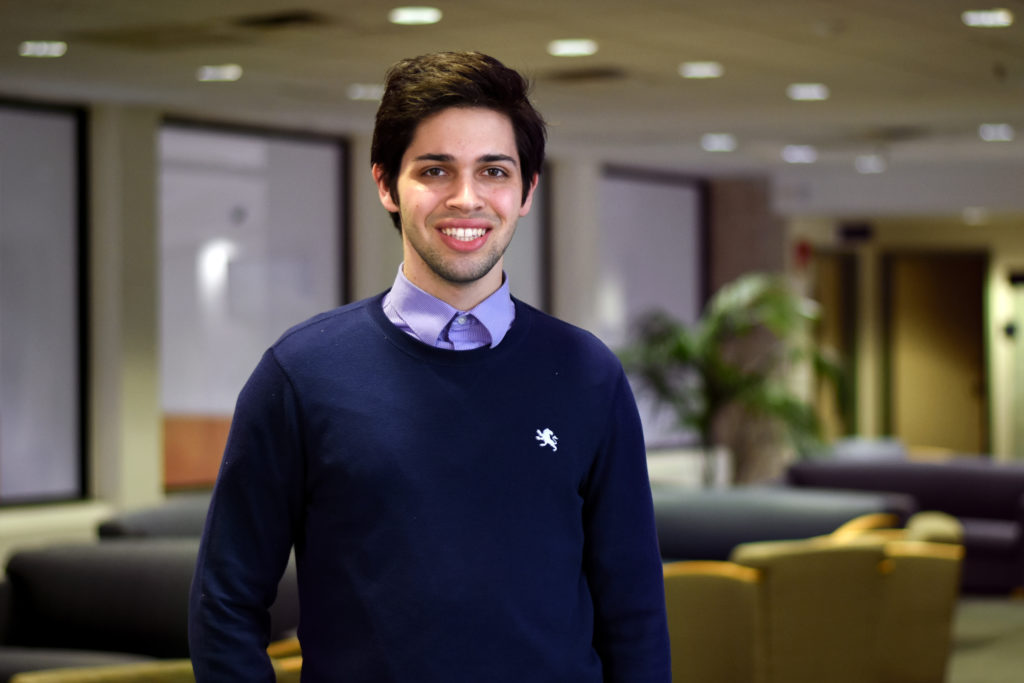When Pedro Rojas came to campus as a freshman, he said he needed a support group for queer men to help him navigate coming out while also grappling with adjusting to life in an unfamiliar setting.
Now four years later Rojas, a senior, created the student organization that mirrors the group he wished was available to him.
Rojas started a student organization called Purple Circle last semester to serve men who are part of the LGBTQ community at GW. The organization will host weekly conversations about issues queer men face on campus like financial disparities in the queer community, hook-up culture and discrimination.
“I had issues with other gay men where I would hear about things in our community and I didn’t really know how to talk about it,” Rojas said. “I didn’t really know who to turn to. There are plenty of conversations that need to be had.”
At the organization’s first meeting Sunday night in the Marvin Center, a group of about 10 students discussed their own challenges with coming out.
Rojas said working with the Posse Foundation – a national student leadership development program – during a resident adviser training session and as a Colonial Cabinet member last summer spurred the idea for the organization. After having conversations about diversity on campus with the group, Rojas said he realized there is a network of LGBTQ people at GW – but no forum for them to discuss the problems they face on campus.
While Rojas said he felt more comfortable coming out at GW because of the “sizable” LGBTQ population, there can be a negative side to the community because students immediately dive into an unknown group when they come out. Rojas said “rapid gossip” in the large population can make it easy to feel isolated and overwhelmed when dealing with the day to day of college life.
“I think the school has an accepting culture that makes it easy to come out here,” he said. “But much of what happens after coming out is difficult to navigate.”
Rojas said he hopes Purple Circle will serve as a way for queer men – or anyone who relates to the issues within the community – to support each other.
“I hope that this organization can not only educate people, but also comfort for others navigating where they are in college – whether they came out five years ago in high school or they’re just starting to go through that process,” Rojas said.
Beyond conversations, Rojas said he wants to host more social events like mixers with other LGBTQ groups on campus, nights out for members to get to know one another and even trips to the gym.
“As a gay man, going to the gym alone is a little tricky and intimidating,” Rojas said.
Rojas visited the Center for Student Engagement to learn more about how to start a student organization to support members of the queer male community on campus. When he arrived, he met Nicholas Kirkstadt, an area coordinator for multiple residence halls on campus, who told Rojas about Purple Circle, an organization at Temple University he joined as a student.
Kirkstadt now serves as the Purple Circle adviser, not only because he happened to be at the CSE that day, but also because of his history with this type of group.
Kirkstadt said he will attend meetings and help facilitate conversation so Purple Circle can serve as an extra support system for LGBTQ students on campus.
“When it comes to gay individuals, we don’t get that representation. We’re not taught what it means to be a gay person in society,” Kirkstadt said. “There are no real role models, there’s nothing ever taught in schools so a lot of us – especially like when I was coming out myself – we had to navigate a lot of this on our own.”
Kirkstadt said Purple Circle can be a place for students to navigate their challenges and successes going through college as a member of the LGBTQ community. He also said that a group like this can be helpful because LGBTQ students are less likely to graduate than their heterosexual peers.
“There’s a lot of studies that those students need a lot more support,” Kirkstadt said. “Having this group where students are able to share what they do and how they handle these challenges is just really beneficial.”
Katherine Abughazaleh and Anna Boone contributed reporting.





